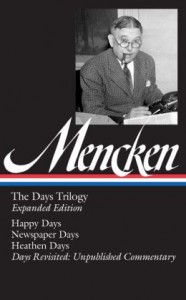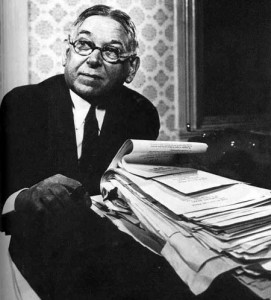 “Hastiness and superficiality are the psychic diseases of the twentieth century, and more than anywhere else this disease is reflected in the press.”
“Hastiness and superficiality are the psychic diseases of the twentieth century, and more than anywhere else this disease is reflected in the press.”
Aleksandr Solzhenitsyn, commencement address, Harvard University (June 7, 1978)
Terry Teachout on the arts in New York City
 The Paris Opera Ballet dances the “Mistake Waltz” sequence from Jerome Robbins’ The Concert (or, The Perils of Everybody), a comic ballet choreographed in 1956 to the music of Chopin:
The Paris Opera Ballet dances the “Mistake Waltz” sequence from Jerome Robbins’ The Concert (or, The Perils of Everybody), a comic ballet choreographed in 1956 to the music of Chopin:
(This is the latest in a series of arts-related videos that appear in this space each Monday and Wednesday.)
 I narrated Project Shaw’s staged reading of George Bernard Shaw’s The Devil’s Disciple last year, and had such a good time that I’ve happily agreed to make a repeat appearance on September 29. I’ll be sharing the stage of Symphony Space with Jefferson Mays and J. Smith-Cameron, two superlatively talented actors whom I admire without reservation, for a performance of Village Wooing, a comic two-hander (Shaw called it a “comedietta for two voices”) written in 1933. My colleagues, needless to say, will be doing all the acting, while I content myself with reading the stage directions out loud.
I narrated Project Shaw’s staged reading of George Bernard Shaw’s The Devil’s Disciple last year, and had such a good time that I’ve happily agreed to make a repeat appearance on September 29. I’ll be sharing the stage of Symphony Space with Jefferson Mays and J. Smith-Cameron, two superlatively talented actors whom I admire without reservation, for a performance of Village Wooing, a comic two-hander (Shaw called it a “comedietta for two voices”) written in 1933. My colleagues, needless to say, will be doing all the acting, while I content myself with reading the stage directions out loud.
Symphony Space is at 95th Street and Broadway. The show starts at seven p.m. To order tickets or for more information, go here.
To read Village Wooing, go here.
Over dessert, the talk would likely turn without prompting to women. Balanchine and Armstrong were both married four times, and though Mencken only tied the knot once, he had his fair share of girlfriends, going so far as to write a book called In Defense of Women. Between the three of them, I dare say quite a bit of light would be shed on the ever-intriguing subject of romance and its discontents….
Read the whole thing here.
 “Unlimited tolerance must lead to the disappearance of tolerance. If we extend unlimited tolerance even to those who are intolerant, if we are not prepared to defend a tolerant society against the onslaught of the intolerant, then the tolerant will be destroyed, and tolerance with them.”
“Unlimited tolerance must lead to the disappearance of tolerance. If we extend unlimited tolerance even to those who are intolerant, if we are not prepared to defend a tolerant society against the onslaught of the intolerant, then the tolerant will be destroyed, and tolerance with them.”
Karl Popper, The Open Society and Its Enemies
 The Library of America is about to bring out an omnibus edition of Happy Days, Newspaper Days, and Heathen Days, in which H.L. Mencken collected the reminiscential essays that he published in The New Yorker in the Thirties and Forties.
The Library of America is about to bring out an omnibus edition of Happy Days, Newspaper Days, and Heathen Days, in which H.L. Mencken collected the reminiscential essays that he published in The New Yorker in the Thirties and Forties.
National Review recently asked me to write about this volume. It happened that I hadn’t looked at any of the Days books since The Skeptic, my Mencken biography, was published in 2002. Nor had I looked at The Skeptic since I last wrote about Mencken. That was four years ago, in a New Criterion essay about the Library of America’s two-volume collection of his Prejudices essays in which I suggested that
Mencken might possibly be a young person’s writer, one who excites the unfinished mind but has less to offer those who have seen more of life. Certainly those who look to literature for a portrait of the human animal that is rich in chiaroscuro will not find it in the Prejudices….If a great essayist is one who succeeds in getting his personality onto the page, then H.L. Mencken qualifies in spades. The problem is that his personality grows more predictable with closer acquaintance, just as the tricks of his prose style grow more familiar. Like most journalists, he is best consumed not in the bulk of a twelve-hundred-page boxed set but in small and carefully chosen doses.
Hence it was a very pleasant surprise to return to the Days books after a long absence and find my original judgment on them to be confirmed anew. I described Happy Days as “one of [Mencken]’s most completely realized achievements…a masterpiece of pure style” in The Skeptic, and went on to say that Newspaper Days was “at least as good….It, too, is a not-so-minor masterpiece of affectionate reminiscence, one that in a better-regulated world would be recognized as a modern classic.”
 The operative word here is “style.” As I said in the epilogue of The Skeptic, Mencken’s enduring strength as a writer “is less a function of his particular convictions than of the firmly balanced prose rhythms and vigorous diction in which they are couched. It is, in short, a triumph of style.” It was in the Days books that his style reached a peak of perfection, and as I reread Happy Days I was struck all over again by how its pages are festooned with utterly characteristic phrases through which his personality shines forth.
The operative word here is “style.” As I said in the epilogue of The Skeptic, Mencken’s enduring strength as a writer “is less a function of his particular convictions than of the firmly balanced prose rhythms and vigorous diction in which they are couched. It is, in short, a triumph of style.” It was in the Days books that his style reached a peak of perfection, and as I reread Happy Days I was struck all over again by how its pages are festooned with utterly characteristic phrases through which his personality shines forth.
Here are some of my favorites:
• “There is a photograph of me at eighteen months which looks like the pictures the milk companies print in the rotogravure sections of the Sunday papers, whooping up the zeal of their cows. If cannibalism had not been abolished in Maryland some years before my birth I’d have butchered beautifully.”
• “To this day I can’t tie a bow tie, though I have taken lessons over and over again from eminent masters…This inapacity for minor dexterities has pursued me all my life, often to my considerable embarrassment.”
• “She had a fist like a pig’s foot and was not above clouting any boy who annoyed her.”
• On a teacher whose spankings were ineffective: “He rattaned conscientiously, but without any noticeable style.”
• On the hot dogs sold in turn-of-the-century Baltimore: “They contained precisely the same rubbery, indigestible pseudo-sausages that millions of Americans now eat, and they leaked the same flabby, puerile mustard.”
 • “The Baltimoreans of those days were complacent beyond the ordinary, and agreed with their envious visitors that life in their town was swell.”
• “The Baltimoreans of those days were complacent beyond the ordinary, and agreed with their envious visitors that life in their town was swell.”
• “The impact of such lovely country upon a city boy barely eight years old was really stupendous. Nothing in this life has ever given me a more thrilling series of surprises and felicities.”
• “To this day I can taste it at the moments when an aging man’s memory searches through his lost youth for bursts of complete felicity.”
I wish I’d quoted that one in The Skeptic, since it is a perfect summary of what Happy Days is all about. And though I’ve never wanted to be able to write like Mencken—to be influenced by him is by definition to imitate him, which is a dead end—I hope that every once in a while my own writing recalls, however vaguely, his matchless verbal vividness.
 The Double Six of Paris sing a vocal version of “Boplicity,” a composition by Miles Davis and Gil Evans originally recorded by Davis’ Birth of the Cool band in 1949. This performance was originally telecast on French TV circa 1960:
The Double Six of Paris sing a vocal version of “Boplicity,” a composition by Miles Davis and Gil Evans originally recorded by Davis’ Birth of the Cool band in 1949. This performance was originally telecast on French TV circa 1960:
(This is the latest in a series of arts-related videos that appear in this space each Monday and Wednesday.)
| M | T | W | T | F | S | S |
|---|---|---|---|---|---|---|
| 1 | 2 | 3 | ||||
| 4 | 5 | 6 | 7 | 8 | 9 | 10 |
| 11 | 12 | 13 | 14 | 15 | 16 | 17 |
| 18 | 19 | 20 | 21 | 22 | 23 | 24 |
| 25 | 26 | 27 | 28 | 29 | 30 | |
An ArtsJournal Blog